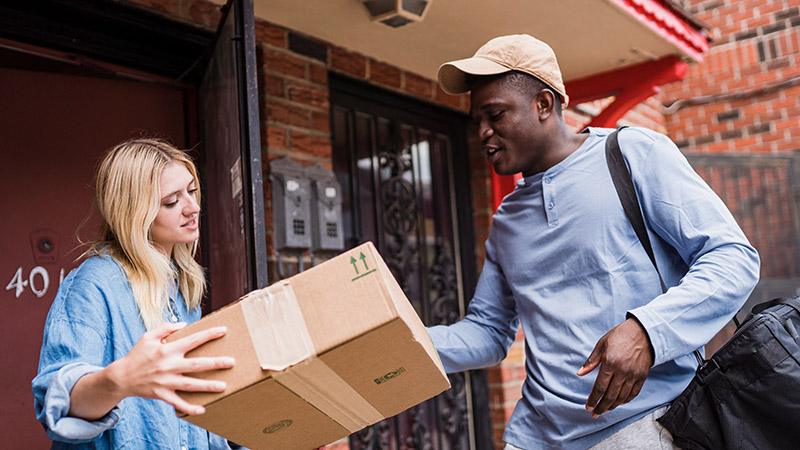Grow your business with the Discover newsletter
Logistics advice & insights straight to your inbox
Subscribe now

WhatsApp is testing functionality that will allow consumers to buy goods from within the WhatsApp chat1 – without leaving the app. If it proves successful, it could turn WhatsApp into a major e-commerce platform almost overnight, with huge possibilities for e-tailers to sell to users.
WhatsApp’s parent company, Meta, has joined forces with JioMart, the Indian online supermarket, to test the new service for the first time.
To begin using the service, an Indian WhatsApp user starts a conversation with JioMart in the chat – ‘Hello’ is enough. They then receive a message from JioMart inviting them to start shopping. They can access the JioMart catalog, add their chosen groceries to their shopping cart, set their shipping address and make their payment, all from within the chat.
Mark Zuckerberg, Meta founder, has no doubt that in-chat shopping will become the norm in the future. Posting on Facebook to announce the alliance with JioMart, he said:
“Business messaging is an area with real momentum and chat-based experiences like this will be the go-to way people and businesses communicate in the years to come.”
With over 500 million Indians using WhatsApp every month, the impact of the new functionality – assuming it works – could be almost instant.

With digitization accelerating in recent years, the way businesses make and receive payments has changed. There has been a significant rise in B2B spending online and internationally.
This rise in international spending isn’t limited to big companies either. Even mid-sized and small businesses are now trading globally.
This change has not gone unnoticed by American Express. According to Amex’s own research conducted among US small and mid-sized companies, 64% expected their spend with businesses outside America to increase over the next six months. However, in the same survey, 27% said complexity was one of the main obstacles to making cross-border payments.2
With this in mind, Amex has developed a new digital payment solution, American Express Global Pay, with the emphasis on simplicity.
Global Pay enables US small businesses to make domestic and international B2B payments, funded from their business bank account, to suppliers in over 40 countries. They can access Global Pay in the same place they manage their Amex Business Card account, using a simple, mobile-friendly platform.
As Dean Henry, EVP of American Express Global Commercial Services said, “Businesses today start, grow and compete on a global scale.”
And now they have a little help from one of America’s global giants.

Worldwide logistics delivery platform, Metapack, has begun working in tandem with UK bike courier start-up, Zedify3, in response to customer desire for more sustainable delivery options.
Metapack offers delivery management software worldwide, with over 350 carriers that ship roughly 550 million parcels per year. According to their own survey of 3,000 Europeans, 75% would consider a more sustainable delivery. While for over 30%, sustainability is the deciding factor when choosing a delivery option.
Described by Metapack’s Strategic Partnership Director, David Randall, as ‘a pioneer in implementing cargo bike deliveries across the UK’, Zedify was founded in 2018 and has delivered over 800,000 packages since. Through the Metapack logistics platform, customers can use Zedify for deliveries from 10 delivery hubs across the UK including London, Cambridge and Brighton.
The partnership is part of a growing trend for e-cargo bikes being used as sustainable delivery options for inner cities. According to Deloitte, e-cargo bikes are expected to be used for 20% of deliveries, with both Amazon and DPD investing in e-bikes for the UK in the past few years.

In 2021, around one in four e-commerce parcels in Germany were returned.4 That’s around 530 million parcels containing 1.3 billion items – more than in any other European country.
On one hand, making it easy to return unwanted items is great for consumer protection and goodwill. On the other, it costs e-tailers money and, especially at German levels, is bad for the environment. Researchers estimate that 795,000 tons of CO2 are due to returns in Germany!
Why are returns so high? One reason is that only one in 10 German online stores charges a fee for a return. That compares to one in two in the rest of Europe.
Another reason is that in Germany the returns period is longer than elsewhere. And the fact that most German customers pay by invoice makes it easier to return products too.
On the upside, German online sellers are very good at recycling their returns, with over 93% of returned products re-sold as new.
But even so, perhaps it’s time for them to think about following the trend for ending free returns.

Until recently, if you bought apparel online, it arrived in simple, transparent plastic bags.5 Not only is this uninspiring but it’s also bad for the environment. And research shows that poor packaging impacts on consumers’ perceptions of a brand.
But things are changing. Responding to demand for an improved unwrapping experience, Sealed Air has developed three pillars to guide its apparel packaging products: Deliver, Delight and Dispose.
As a minimum for ‘Deliver’, packaging must be robust and easily transported, so items arrive in good condition. A better solution would also be easily opened and closed for returns, with smart features such as QR codes.
‘Delight’ recognizes the power of packaging as a marketing tool. Stylish, innovative packaging can project a brand’s image and differentiate it from competitors. While personalized messaging or storytelling can connect with recipients, as they unwrap.
Finally, ‘Dispose’ ensures packaging meets consumers’ increasing sustainability demands. Key is to understand the pros and cons of each material, in terms of renewability, timeframe, energy sources required and availability.
Sealed Air is helping elevate the apparel e-commerce experience. But whatever sector you’re in, never underestimate the impact of packaging.
1 - Frank Calviño, Cross-Border Magazine, September 2022
2 - Retail Dive, September 2022
3 - Jasmijn, E-commerce News Europe, September 2022
4 - Pleuni, E-commerce News Europe, September 2022
5 - Just Style, September 2022